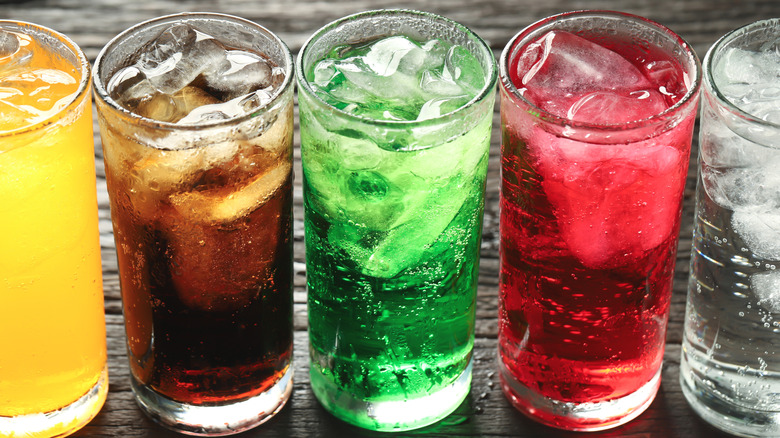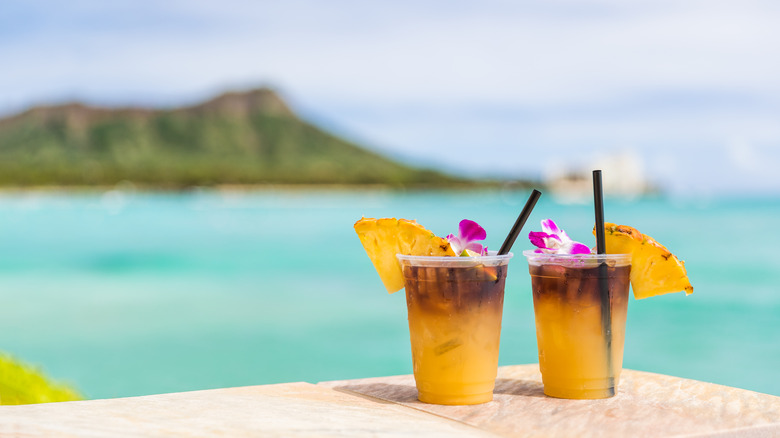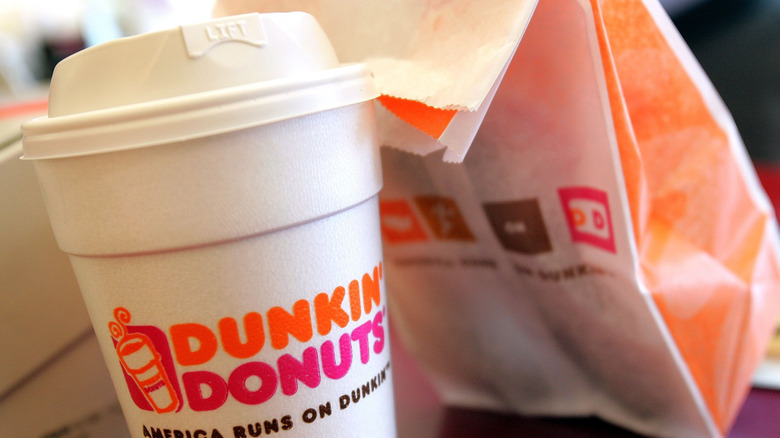Which State Consumes The Most Sugary Drinks? It's One Of The Smallest
It's hard to deny the downsides of excess sugar: type 2 diabetes, tooth decay, and obesity to name a few. According to the American Heart Association, the average American consumes two to three times the recommended amount of sugar per day. A major culprit? Sugary drinks.
Most folks can agree that skipping soda is easier said than done. But as a study published in 2021 shows, it's harder for people in some communities more than others. The study — which used data collected by the National Center for Health Statistics (NCHS) between 2010 and 2015 — compared state-by-state data on the number of Americans who drink sugary drinks on a daily basis. Researchers included soda, sports drinks, sugary coffee (and tea), and sweetened fruit drinks like lemonade.
The study found that 63 percent of American adults drink sweet drinks daily, but some states drink significantly more. The top spot? Tiny Hawaii, where 76.4% of adults drink at least one sugary drink per day.
Marketing, access, and culture contribute to regional differences. The beverage industry often targets minorities and low-income communities where healthier options aren't always available. But research shows that education can help. When health officials in Alaska — which boasts the country's lowest numbers — noticed that kids were drinking more sugary drinks, the state upped its efforts to educate moms. The numbers dipped back down, sparking hope that the next generation of Alaskans will stay smart about sugar.
Why do Hawai'ians drink so many sweet drinks?
A paper published in the Hawaii Journal of Health and Social Welfare blames the beverage industry for fostering Hawaii's sweet tooth. "In Hawaii, the beverage industry has exploited local culture, portraying [sugar sweetened beverages] at popular local beaches and framing them as a way to 'live Aloha,'" the paper explained, referencing a Pepsi campaign that tapped into the state's strong sense of community and culture. The paper suggested adding a $0.02 per ounce tax on sweet drinks, which would earn the state an estimated $60.5 million. The extra money, the paper's authors suggested, could go towards public health.
While legislators proposed a tax on sugary drinks in 2021, the bill ultimately flopped. But the state's government is still stepping up, especially when it comes to the youngest citizens. In Hawaii, 75 percent of kids consume sugary drinks daily. It's not that Hawaiian parents don't care, though. Focus groups found that many parents recognized the danger of sodas, but didn't know about the sugar hiding in fruit drinks. In 2023, the state launched a campaign aimed at educating parents. Ads from the campaign explained that words like "natural" or "vitamin C" didn't necessarily mean a drink was healthy. "Don't fall for the beverage industry's SWEET LIES," urged the tagline. Lawmakers are still hoping to tax sugary drinks, too. A new bill is currently in the works.
Which region drinks the most sugary drinks
The NCHS study analyzed America's sugar intake by region, too. But if you're already making assumptions, you might want to think again. Despite stereotypes about the South with its history of sweet tea and soda, the top spot goes to the Northeast. 67% of people living in the region drink at least one sugary drink a day.
Those numbers might seem surprising. The Northeast isn't necessarily known for its sweet tooth. But the study offered an explanation. According to the study's authors, the numbers "may be due to high consumption of sweetened coffee or tea drinks." Read: New Englanders love Dunkin Donuts.
The lesson? Sugar doesn't just come from soda. One study found that people were more likely to report drinking sugary drinks if researchers specifically ask about drinks like coffee, tea, and sweetened fruit drinks, suggesting that we tend to forget about sugar from other sources. That doesn't mean you necessarily need to deny yourself the occasional chocolate-drizzled, whip-topped coffee creation — but if you're trying to keep your sugar consumption low, don't forget about sugar-packed fast-food coffees or saccharine so-called health drinks.


